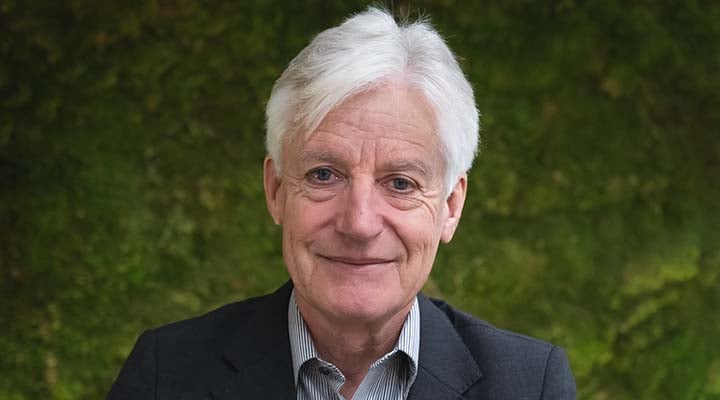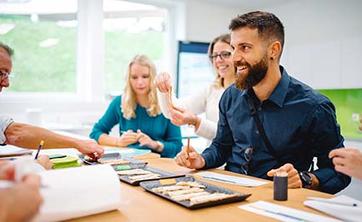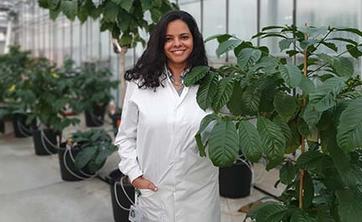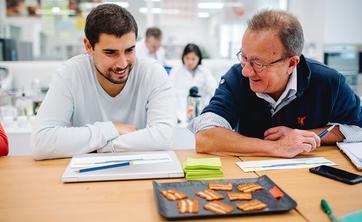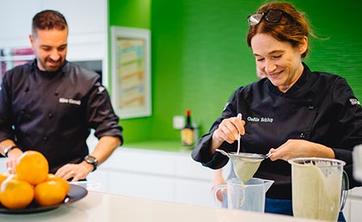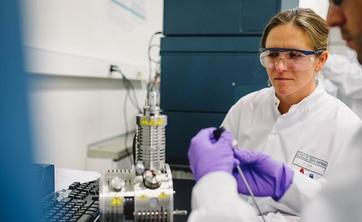Research partnerships and public-private partnerships

Partnerships are key to our success at Nestlé. We work closely with a wide range of academic institutions and public organizations worldwide.
Our partnerships are based on the Nestlé Policy on Public-Private Science & Research Partnerships (pdf, 1Mb). A policy that promotes academic freedom, neutrality, ethics and integrity.
Some of our key partnerships
-
Center for Microbiome Innovation (CMI) Our partnership with the University of California San Diego Center for Microbiome Innovation (CMI) is focused on understanding the microbiome's impact on human health. Together, we're accelerating the development of innovative nutritional solutions that promote health and wellbeing. -
Ecole Polytechnique Fédérale de Lausanne (EPFL) We have a long-term relationship with EPFL. As well as being two founding partners of the Swiss Food & Nutrition Valley, we fund and collaborate on a range of research.
This includes biodegradable packaging (BioPack), hardware/software platform design for beverage systems, while we collaborate on research into cellular nutrition and brain health.
In May 2020, we announced that we will co-fund a new professorship at EPFL for sustainable materials. -
EpiGen Consortium We collaborate with the EpiGen Consortium, an alliance with researchers in Southampton, Auckland and Singapore.
Here, we're focusing on pregnancy, infancy and childhood growth as well as metabolic health.
Our joint research has led to a clinical trial, NiPPeR, aimed at improving glucose metabolism in pregnancy and infant body composition.
EHL (Ecole Hôtelière de Lausanne)
Nestlé's collaboration with EHL includes a program to translate scientific discoveries into prototypes, new recipes for our research or R&D Accelerator projects, plus joint work with Nestlé Research on publications.
Through R&D workshops, EHL students benefit from Nestlé's expertise to inspire recipe creation. These activities build on the established annual EHL-Nestlé Culinary Contest. See how the contest works here.
-
ETH Zurich We sponsor a range of food science research at ETH Zürich and work with the institution to fund post-doctoral fellowships under the Future Food Initiative.
In the field of food technology and nutrition, Nestlé is co-funding research and teaching, as well as a new professorship. Through a major research program, we're exploring interdisciplinary solutions to mitigate the effects of climate change, while increasing nutritional quality and yield in dairy and crop farming. -
Future Food Initiative We're founding members of the Future Food Initiative with EPFL and ETH Zurich, and our industry partners Bühler and Givaudan.
This initiative encourages food and nutrition research in areas relevant to consumer trends and sustainability. It includes a post-doctoral fellowship program to promote young scientists. -
Imperial College London Our research partnership with Imperial College London focuses on nutritional science. It covers a wide range of areas, including the microbiome and the gut-brain axis. -
Technical University of Munich Our long-standing partnership with Technical University Munich (TUM) supports projects on aroma, taste and texture, as well as plant-based nutrition.
Swiss Food and Nutrition Valley
Nestlé co-founded the Swiss Food and Nutrition Valley (SFNV) innovation ecosystem with our partners. Our aim is to develop sustainable solutions for the future of food and nutrition, using cutting-edge science and technology.
Together, we're attracting talent, startups and investment, to strengthen the existing ecosystem for food and nutrition innovation. The Swiss Food and Nutrition Valley also organizes events.
At the heart of the Valley sits our R&D Accelerator at Nestlé Research. This unites Nestlé scientists, students and startups to accelerate the development of innovative products and systems.
Student-related activities
-
Ecotrophelia Europe We support Ecotrophelia (the European Food Innovation Student Awards), a competition where student teams compete to develop the most innovative food recipes. Student innovations might be based in a concept, formulation, nutritional qualities, packaging, or in a product's sustainable character. This is one of the actions we take to support entrepreneurship as part of our Nestlé Needs YOUth initiative. -
European Master's in Food Studies (EMFS) Nestlé supports EMFS, a two-year MSc Food Technology program led by Wageningen University & Research (WUR). Participants study modules at four top universities: WUR, University College Cork, AgroParisTech and Lund University. In their second year, students complete a nine-month placement with a food industry partner, one of which is Nestlé. -
University of Lausanne (UNIL) We have a framework agreement between Nestlé and University of Lausanne (UNIL).
This allows students from the university's Faculty of Biology and Medicine to obtain their PhD or MD-PhD there, while completing their project at Nestlé Research.
-
University of Ghana Through an agreement with the University of Ghana, we've committed to enhancing nutrition and sustainability research. This is part of our effort to contribute to the local innovation ecosystem, by supporting emerging students, and collaborating with startups and innovation partners.
The grant will support PhD student projects related to the development of affordable, nutritious products and the public health impact of iron deficiency campaigns. We'll also be backing projects on the behavioral change needed to drive recycling of packaging materials.
The relationship builds on Nestlé's strong collaboration with the academic network in sub-Saharan Africa. In 2019, we ran an R&D innovation challenge, which resulted in three startups taking up a four-month residency at the Nestlé R&D Accelerator in Abidjan.

-
Nestlé International Nutrition Symposium We're exploring scientific perspectives on a more informal basis too. For example, in September 2022 we hosted the 15th edition of the Nestlé International Nutrition Symposium. This two-day event brought together more than 20 leading scientists to discuss how we can preserve nutritional goodness from farm to fork.
Scientific Advisory Board
Our Scientific Advisory Board is an independent advisory panel of world-renowned academics and thought leaders with expertise in nutrition, food and health science. The board meets once a year to advise Nestlé on the company's long-term scientific strategy.
SAB is also a platform where Nestlé researchers and external experts can share knowledge and insights on scientific topics of shared interest.
The current SAB members are:
-
Prof. Sir Stephen Bloom Imperial College London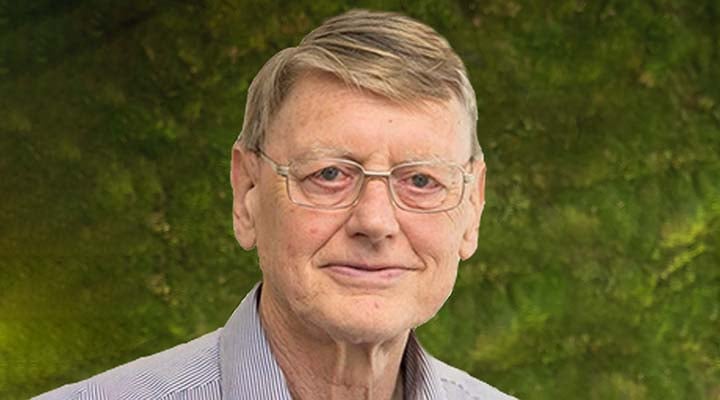
-
Prof. Melina Claussnitzer The Broad Institute and Universität Hohenheim
-
Prof. Adam Drewnowski University of Washington, Seattle
-
Prof. Thomas Hofmann Technische Universität München
-
Prof. Simin Nikbin Meydani Tufts University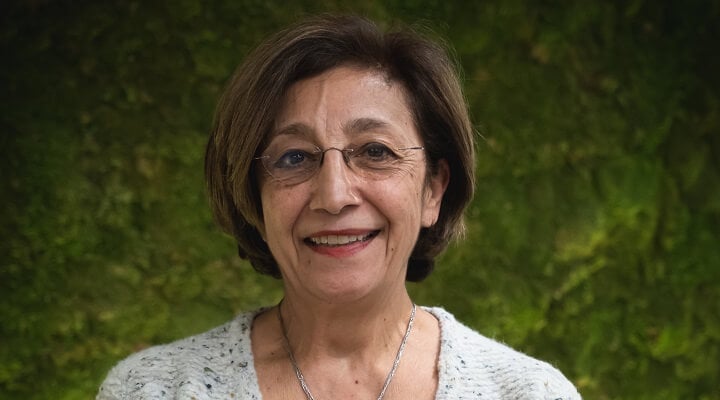
-
Prof. Erich Windhab Swiss Federal Institute of Technology Zürich
-
Prof. Ramnik Xavier Massachusetts General Hospital and Broad Institute Boston
-
Prof. Ian McDonald University of Nottingham